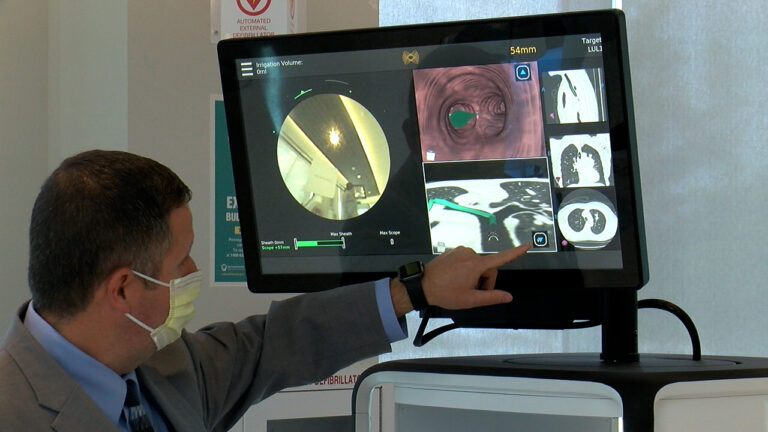
ENOLA, Pa. (WHTM) — Early detection of lung cancer can make a big difference when it comes to survival. A new robotic tool has been introduced here in the Midstate, and it’s all about getting that diagnosis.
Penn State Health Hampden Medical Center had a live demonstration.
Doctors at Penn State Health say lung cancer kills more people every year than breast, prostate, and colon cancers combined.
This robotic technology is designed to help beat lung cancer and save lives.
“This is the first and only one in the area Penn State Health Hampden Medical Center navigational bronchoscopy has been around but not with the robotic component for very long,” Pulmonary and Critical Care doctor with Penn State Health Dr. Christopher Shaffer, MD said.
Get the latest news on Pennsylvania Politics and the 2022 Election from Your Local Election Headquarters. Sign up here.
With the Monarch Robotic-assisted bronchoscopy doctors will place a camera in the windpipe and navigate spots on the lungs with a controller.
It uses GPS and robotic technology to give doctors precise movements and can see further into the lungs.
“With this, we can actually see the lung tissue we are hitting and with some of the programming that we have they’re able to give us the views that are going to tell us where our tools are going to go when we try to get the sample, we had that before with previous technology,” Dr. Shaffer said.
Pulmonologists with Penn State Health say they have been fighting for technology like this for quite some time.
“We had an older technology before, that allowed us to use navigation to reach small nodules in the lung, but this technology improves on that because it allows for greater reach, greater vision, and greater control,” Pulmonologist with Penn State Health, Dr. Henry Ostman said.
Get the latest breaking news, weather, sports, and politics from the abc27 newsletters. Click here to sign-up today!
Doctors say this will help minimize complications, assist in gathering tissue, and help save lives with early detection of lung cancer.
“We want to improve patient outcomes improve our abilities with what we’re able to do ideally to make things smoother get the diagnoses early and ideally lower healthcare costs for everybody,” Dr. Shaffer said.
Doctors say they are very excited to have this equipment and track data.
“Lung cancer is a leading cancer killer and part of the lethality related to lung cancer is the late stage diagnoses this device will allow us to reach those legions far earlier and diagnose them far earlier which may translate to better treatment,” Dr. Ostman said.
Medical professionals say they expect huge improvements in helping people survive.
Stay up to date on the latest from abc27 News on-air and on the go with the free abc27 Mobile app.